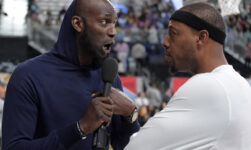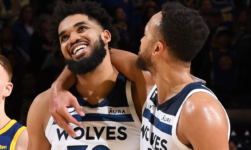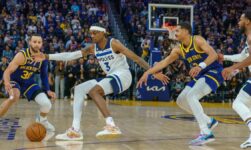Los Angeles Lakers star LeBron James weighed in on the Robert Sarver situation on Wednesday, taking to Twitter to issue a brief statement in which he expressed his disappointment in how the league handled the matter.
His full comments:
“Read through the Sarver stories a few times now. I gotta be honest…Our league definitely got this wrong. I don’t need to explain why. Y’all read the stories and decide for yourself. I said it before and I’m gonna say it again, there is no place in this league for that kind of behavior. I love this league and I deeply respect our leadership. But this isn’t right. There is no place for misogyny, sexism, and racism in any work place. Don’t matter if you own the team or play for the team. We hold our league up as an example of our values and this aint it.”
The NBA concluded its nearly year-long investigation into Phoenix Suns and Phoenix Mercury owner Robert Sarver earlier this week, determining that he used the N-word on at least five occasions, engaged in instances of inequitable conduct toward female employees, and engaged in demeaning and harsh treatment of employees.
Despite confirming such indefensible conduct, the investigation found that Sarver’s actions were not “motivated by racial or gender-based animus,” and the league did not have any discussions about removing Sarver as owner. Instead, he was given a one-year suspension and fined $10 million.
During a press conference on Wednesday, NBA commissioner Adam Silver explained why Sarver was not forced to sell his team like former Los Angeles Clippers owner Donald Sterling was back in 2014. Silver noted, in part, the lack of any audio or visual evidence against Sarver, a different context for his actions and the positive support Sarver received from many people who were interviewed.
It’s also worth noting that Silver does not have the power to unilaterally remove Sarver, or any other owner, from the league. In 2014 he initiated a legal process to force Sterling to sell the team, but ultimately that still needed the support of three-fourths of the other owners. The league decided not to go down that path this time, and it’s unclear if the votes from other owners would have been there in this scenario.
LeBron is the first star player to speak out against the league’s decision, and it would not be surprising to see others follow in his footsteps. What impact, if any, such statements will have, however, remains to be seen.
It’s clear the players do have power in such situations. During the Sterling saga, the Clippers and Golden State Warriors nearly boycotted a playoff game before ultimately settling on a silent protest of warming up without any gear bearing the clubs’ logos. In addition, the NBPA called for an immediate harsh punishment and players around the league expressed strong, direct outrage about his behavior.
Such strong reactions from the players played a part in removing Sterling from the league, but they came before the league made a judgement, not after. Also, the Sarver punishment was handed down during the offseason, so the players do not have an immediate option to stop a game from being played or hold a protest.
If LeBron and the players are willing to start disrupting the actual on-court product, then perhaps they can force the league and owners to explore removing Sarver. Barring that level of action, it seems such statements are unlikely to make the league change its mind.






